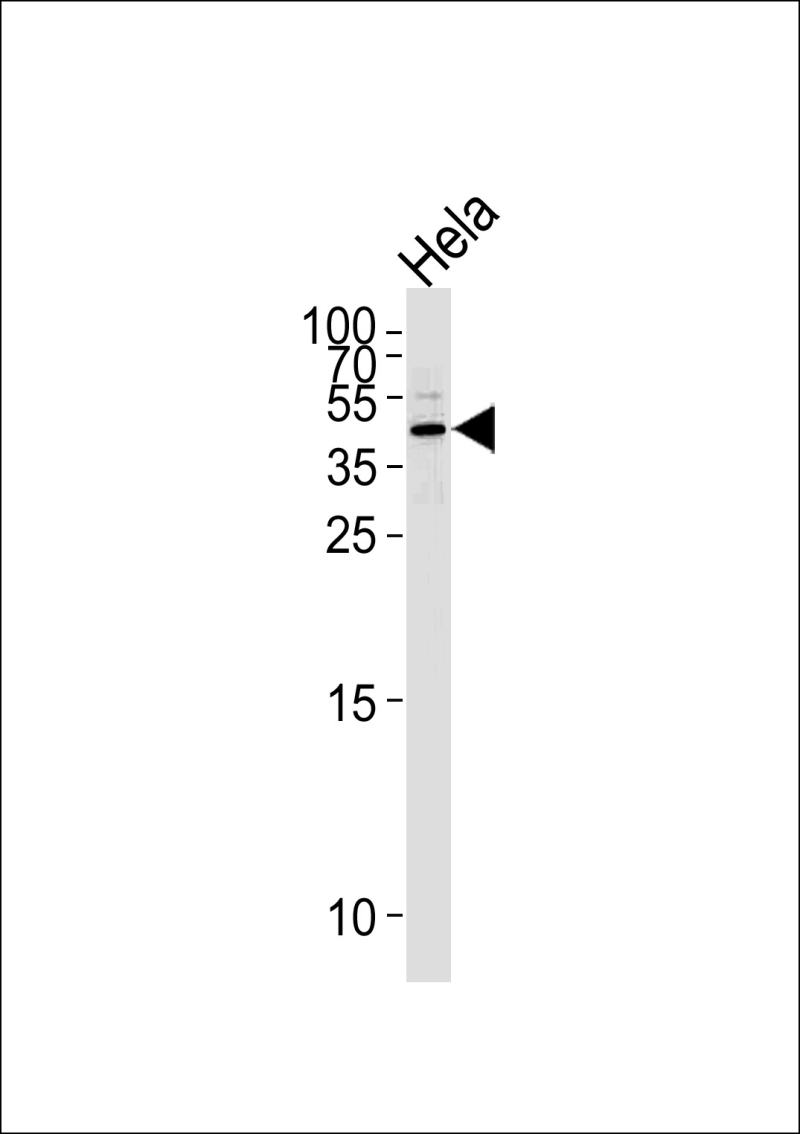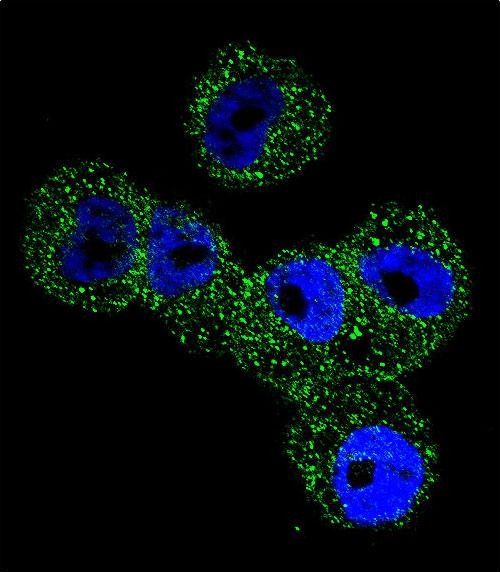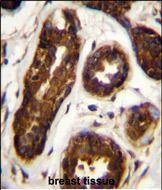


| WB | 1/1000 | Human,Mouse,Rat |
| IF | 咨询技术 | Human,Mouse,Rat |
| IHC | 1/100-1/500 | Human,Mouse,Rat |
| ICC | 1/10-1/50 | Human,Mouse,Rat |
| FCM | 咨询技术 | Human,Mouse,Rat |
| Elisa | 咨询技术 | Human,Mouse,Rat |
| Aliases | Serpin B5, Maspin, Peptidase inhibitor 5, PI-5, SERPINB5, PI5 |
| Entrez GeneID | 5268 |
| WB Predicted band size | 42.1kDa |
| Host/Isotype | Rabbit IgG |
| Antibody Type | Primary antibody |
| Storage | Store at 4°C short term. Aliquot and store at -20°C long term. Avoid freeze/thaw cycles. |
| Species Reactivity | Human, Mouse, Rat |
| Immunogen | This Maspin antibody is generated from rabbits immunized with a KLH conjugated synthetic peptide between 94-123 amino acids from the Central region of human Maspin. |
| Formulation | Purified antibody in PBS with 0.05% sodium azide. |
+ +
以下是关于Maspin抗体的3篇代表性文献(信息基于公开研究整理,非实时数据库检索):
1. **文献名称**:*Maspin expression in invasive breast cancer: associations with prognostic markers*
**作者**:Zou Z 等
**摘要**:该研究通过免疫组化(使用Maspin特异性抗体)分析乳腺癌组织中Maspin的表达水平,发现其表达缺失与肿瘤高侵袭性及不良预后显著相关,提示Maspin可能通过抑制细胞迁移发挥抑癌作用。
2. **文献名称**:*Tumor suppressor maspin and its application in cancer therapy*
**作者**:Sager R 等
**摘要**:文章综述了Maspin在肿瘤抑制中的分子机制,重点讨论了其抗体在诊断中的应用(如ELISA和免疫印迹法检测患者血清Maspin水平),并探索了基于Maspin表达的靶向治疗策略。
3. **文献名称**:*Maspin inhibits cell migration and invasion by regulating EMT-related markers in prostate cancer*
**作者**:Shi HY 等
**摘要**:研究利用Maspin抗体进行Western blot和免疫荧光实验,证实过表达Maspin可通过下调上皮-间质转化(EMT)标志物(如N-cadherin)抑制前列腺癌细胞侵袭,机制涉及PI3K/AKT通路调控。
---
**备注**:实际引用时建议通过PubMed或Web of Science核对最新文献,部分经典研究可能已被更新或补充。
Maspin (mammary serine protease inhibitor), encoded by the *SERPINB5* gene, is a member of the serine protease inhibitor (serpin) superfamily. Initially identified as a tumor suppressor in breast cancer, maspin exhibits context-dependent roles in regulating cell adhesion, motility, invasion, and metastasis. Its mechanisms involve interactions with extracellular matrix components, inhibition of angiogenesis, and modulation of gene expression through epigenetic pathways. While maspin is often downregulated in advanced cancers, paradoxical pro-tumorigenic effects have been reported in certain malignancies, highlighting its complex, tissue-specific behavior.
Maspin antibodies are essential tools for detecting maspin expression in research and diagnostics. Commonly used in techniques like immunohistochemistry (IHC), Western blotting, and immunofluorescence, these antibodies help correlate maspin levels with clinical outcomes. Studies associate maspin loss with poor prognosis in breast, prostate, and pancreatic cancers, though conflicting findings underscore the influence of tumor microenvironment and post-translational modifications. Commercially available maspin antibodies include monoclonal (e.g., mouse-derived clones G167-70 and EAW24) and polyclonal variants, often validated for specificity using knockout controls or peptide blocking assays. Challenges include cross-reactivity with other serpins and variability in formalin-fixed tissue staining. Beyond oncology, maspin antibodies aid studies in developmental biology and epithelial-mesenchymal transition (EMT), reflecting its role in cellular differentiation and tissue homeostasis. Ongoing research aims to clarify maspin's dualistic functions and therapeutic potential.
×